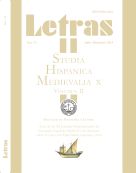Utopia: the Story of a Journey from the Middle Ages to the Renaissance
Keywords:
Thomas More, Utopia, Literary Devices, “Travel Writing” GenreAbstract
The best Republic and the island of Utopia, published in 1516, is Thomas More’s seminal work, where the author best expresses his philosophical and political thought. The book proposes the existence of an ideal economic, social and political organization shaped as a kind of “travel writing” story, describing an imaginary society located on the island of “Utopia” —that could become real or possible—, in order to convey More’s philosophical ideas. More and his “Utopia” describe a “journey” from the Medieval man, attached to a conception of spiritual and political power in crisis, towards the Renaissance man, eager for new ideas and enthusiastic for new horizons opened through studying the ancient classics. Winston Churchill, writing about More’s place in the History of the English-Speaking People, observed: “More stood as the defender of all that was finest in the medieval outlook. He represents to history its universality, its belief in spiritual values and its instinctive sense of other-worldliness, but a system, which had for long furnished mankind with its brightest dreams”. Finally, it is also the objective of this study to analyze More’s “Utopia” and identify the main literary devices and specific aspects of the “travel writing” genre, from a critical-interpretive-analytical approach.Downloads
Download data is not yet available.
Downloads
Published
2019-04-22
How to Cite
Blanco González, P. A. (2019). Utopia: the Story of a Journey from the Middle Ages to the Renaissance. Letras, 2(72), 21–36. Retrieved from https://e-revistas.uca.edu.ar/index.php/LET/article/view/1768
Issue
Section
Ponencias. Escrituras del viaje en la Edad Media hispánica
License












